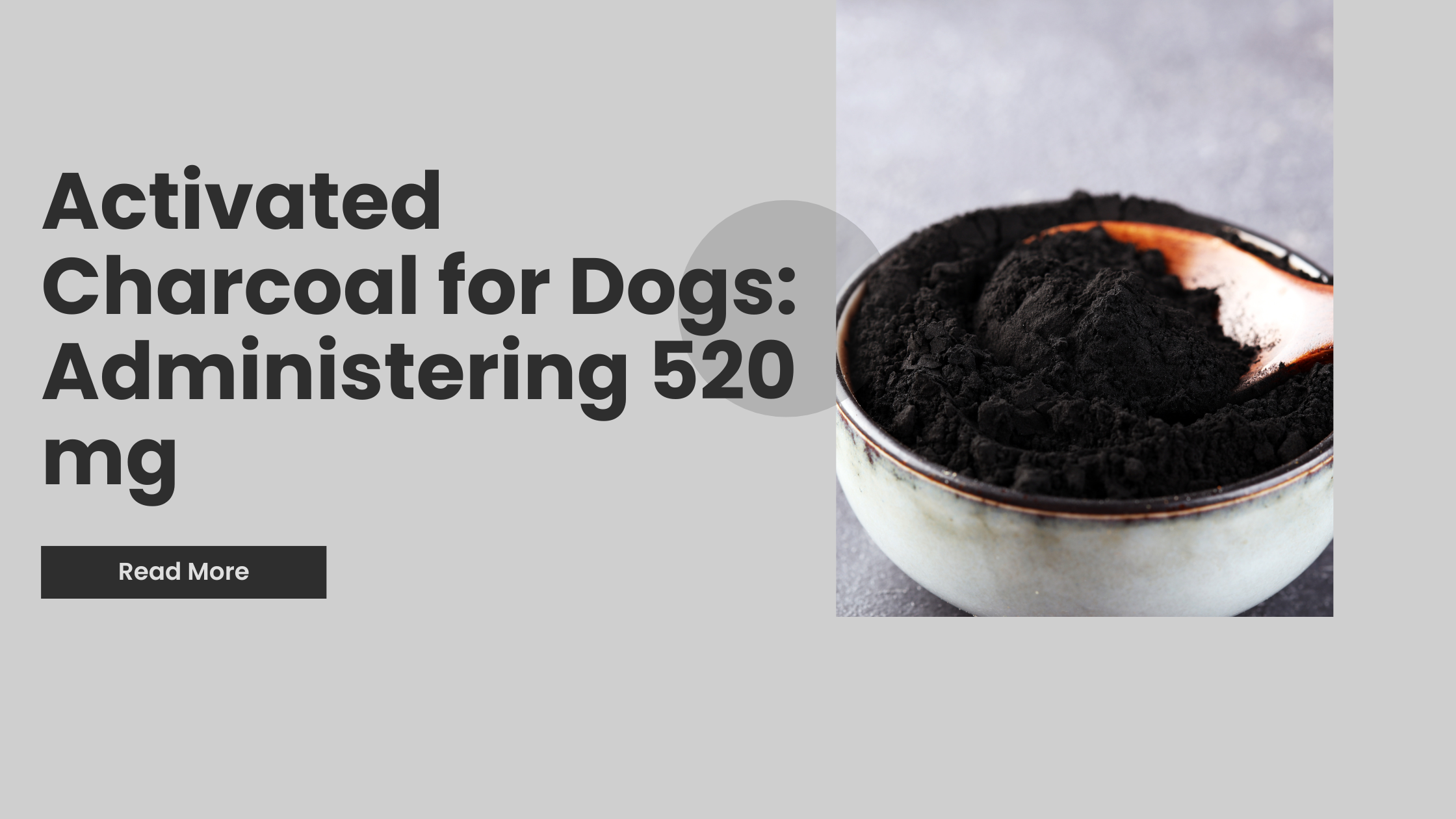Activated Charcoal for Dogs: What You Need to Know Before Administering 520 mg

Are you considering giving your dog activated charcoal? In this article, you’ll learn the key things to consider before administering 520 mg of activated charcoal to your pup.
We all want what’s best for our furry friends, and when it comes to pet healthcare decisions, it can be a stressful situation. You don’t want to make an irresponsible choice without doing your research first!
I’m a pet wellness enthusiast who has been studying alternative treatments for pets for years. Over that time, I’ve learned about the benefits and risks associated with giving dogs activated charcoal.
This article is specifically written for pet parents looking into “activated charcoal for dogs”. It will provide information on proper dosage levels along with helpful tips on how to administer activated charcoal safely and effectively.
What is activated charcoal?
The porous nature of activated charcoal allows it to trap and bind toxins, preventing them from being absorbed by the body. Once these toxins are trapped, they can be safely eliminated through the digestive system. This makes activated charcoal a popular remedy for treating drug overdoses or accidental poisonings.
One of the main benefits of using activated charcoal is its ability to alleviate gas and bloating. When taken orally, it can absorb excess gas in the digestive system, reducing discomfort and promoting better digestion. It can also help relieve symptoms of food poisoning or stomach flu by removing harmful bacteria or viruses from the gut.
In addition to its detoxifying properties, activated charcoal has also been used as a skincare ingredient due to its ability to draw out impurities from the skin. Its porous surface acts like a magnet for dirt, oil, and other pollutants that clog pores and contribute to acne or dull complexion. By incorporating products with activated charcoal into your skincare routine, you can achieve clearer, healthier-looking skin.
Overall, activated charcoal is a versatile treatment that offers numerous health benefits. Whether you’re looking for relief from digestive issues or want to improve your skin’s appearance, this natural remedy may be worth considering. Just remember to consult with a healthcare professional before using it as a treatment method since individual needs may vary.
We have covered an extensive guide on Ashwagandha which includes can dogs eat lamb shank bones. Further to better understand the herb and its various uses, we have covered topics like are craisins bad for dogs which you might be interested in. Also, check out our recent posts: how much camphor is toxic to dogs
How does activated charcoal work?
Activated charcoal is like a superhero for your tummy! Imagine this: you accidentally gobble up something toxic, and panic starts to set in. But fear not, because activated charcoal swoops in to save the day. When you ingest this magical substance, it acts like a magnet, attracting all those toxins lurking in your stomach and intestines. It binds itself tightly to them, forming an unbreakable bond that prevents them from entering your bloodstream.
It’s truly incredible how activated charcoal can neutralize the harmful effects of poisoning or ingestion of certain substances. Picture this: let’s say you accidentally swallow some poisonous chemicals or medications that could wreak havoc inside your body. The activated charcoal comes to the rescue by grabbing onto those dangerous molecules and escorting them safely out of your system before they even have a chance to cause harm.
Now, here’s where things get even more interesting – **bullet list time**! With its astonishing powers:
– Activated charcoal can help with drug overdoses by absorbing excess medication.
– It can also be beneficial for individuals suffering from food poisoning as it helps eliminate the toxins causing their discomfort.
– People who have ingested alcohol or certain types of drugs may find relief with activated charcoal as well since it aids in detoxification.
So next time you’re feeling worried about accidental poisonings or ingestion mishaps (hey, it happens!), remember that activated charcoal is there for you – ready to swoop in and protect you from harm!
Also Read: https://cleverdogcare.com/is-echinacea-poisonous-to-dogs/
Benefits of using activated charcoal for dogs
Activated charcoal is a powerful substance that works by binding to toxins and chemicals in the body, preventing them from being absorbed. When dogs accidentally ingest harmful substances like medications, household cleaners, or toxic plants, activated charcoal can be administered to help minimize the effects. The recommended dosage for dogs is typically 1 gram of activated charcoal per kilogram of body weight.
In cases of accidental ingestion, time is of the essence. Administering activated charcoal as soon as possible after ingestion can significantly reduce the absorption and distribution of toxins in the dog’s system. It acts like a magnet, attracting and trapping harmful substances so they can be safely eliminated through feces.
Additionally, activated charcoal can provide relief for dogs suffering from gastrointestinal issues such as diarrhea or gas. It helps absorb excess gas in the intestines and neutralizes toxins that may be causing digestive discomfort. This natural remedy has been used for centuries to treat various ailments in humans and animals alike.
When using activated charcoal for dogs, it’s important to consult with your veterinarian first to determine the appropriate dosage based on your dog’s size and condition. Always follow their instructions carefully to ensure proper administration and effectiveness.
To summarize:
– Activated charcoal is beneficial for dogs in cases of accidental toxin ingestion.
– It works by binding to harmful substances and preventing their absorption.
– Administering it promptly reduces the effects of ingested toxins.
– Additionally, it provides relief for gastrointestinal issues like diarrhea or gas.
– Consult with your veterinarian before using activated charcoal for your dog.
Also Read: https://cleverdogcare.com/can-dogs-eat-quenepas/
Risks and precautions
Activated charcoal is a popular remedy for various health issues in dogs, thanks to its ability to absorb toxins and chemicals in the body. However, it’s essential to remember that not all cases require the use of activated charcoal, and self-diagnosis can lead to unexpected complications.
Your veterinarian plays a vital role in determining if activated charcoal is necessary for your furry friend. They are equipped with the knowledge and expertise needed to assess your dog’s medical history, current medications, and any underlying conditions that could affect the effectiveness or safety of activated charcoal treatment.
- Firstly, certain medications may interact negatively with activated charcoal. Your vet will review your dog’s prescription drugs and evaluate whether using activated charcoal alongside them could compromise their efficacy.
- In addition to medication interactions, specific medical conditions might make administering activated charcoal risky for your pet. Conditions such as gastrointestinal blockages or perforations require careful consideration before initiating treatment.
Relying solely on professional guidance will ensure you avoid any potential harm or unforeseen consequences when utilizing this powerful substance. Remember that every dog is unique; what works well for one may not be suitable for another. So trust in your veterinarian’s expertise and rest easy knowing you’re providing the best care possible for your beloved canine companion.
Also Read: https://cleverdogcare.com/can-dogs-eat-quenepas/
Proper dosage levels
When it comes to the recommended dosage for dogs, there are a few factors that come into play. One of the most important considerations is your dog’s weight. Just like humans, dogs come in all shapes and sizes, and their weight can significantly impact how much medication or supplement they should receive.
Another crucial factor to consider is your dog’s condition. Is your furry friend suffering from an upset stomach? Or maybe they’ve ingested something toxic? Activated charcoal can be a helpful remedy in these situations, as it works by absorbing toxins and preventing them from being absorbed into the bloodstream.
So, how much-activated charcoal should you give to your pup? Well, this is where your vet’s expertise comes in. They will take into account various factors such as your dog’s weight, age, overall health condition, and the severity of their symptoms. Based on these considerations, they will provide you with specific instructions on the dosage.
In general, activated charcoal for dogs usually comes in tablet or powder form. Your vet may recommend giving it directly to your pet or mixing it with food to make administration easier. It’s essential to follow their instructions carefully and not exceed the recommended dosage.
Also Read: https://cleverdogcare.com/is-potentilla-indica-poisonous-to-dogs/
Administering activated charcoal safely
To begin, let’s talk about the importance of safe administration when it comes to using activated charcoal powder for your pet. You see, this powerful substance can be quite effective in treating certain cases of poisoning or overdose in animals. But just like with any medication, proper dosing and administration are key to ensuring its effectiveness and avoiding any potential risks.
So, how do you go about mixing the 520 mg-activated charcoal powder? Well, first things first, always consult your veterinarian for specific instructions tailored to your pet’s needs. Once you have those guidelines in hand, gather all the necessary supplies – a syringe if needed, and some water or a suitable liquid suspension.
Now here comes the fun part! Take out that trusty mixing bowl and add the prescribed amount of activated charcoal powder into it. Pour in enough water or liquid suspension as directed by your vet to create a smooth mixture. Make sure to stir it thoroughly until all lumps are gone and you’re left with a consistent blend.
Once everything is mixed up nicely, you have two options for administering it – orally through a syringe or by mixing it into food. If going down the oral route with a syringe, draw up the appropriate dose into the syringe carefully without any air bubbles present. Then gently insert the tip of the syringe into your pet’s mouth near its cheek and deliver the mixture slowly while keeping an eye on their comfort level.
On another note, if blending it with food is more feasible for your furry friend, simply pour that well-prepared mix onto their meal and give them time to gobble it up like they would any other treat (hopefully!). And voila! You’ve successfully mastered the safe administration of activated charcoal powder for pets.
Remember though – always follow your veterinarian’s instructions closely when handling medications for your beloved companion because their health matters most!
When should you use activated charcoal for dogs?
Activated charcoal is a powerful substance that can be used to treat certain cases of accidental ingestion in dogs. However, it should never be given without veterinary supervision and only in specific situations.
One of the main uses for activated charcoal is when a dog has ingested toxic substances such as household cleaners or certain foods that are toxic to them. In these cases, the charcoal works by binding to the toxins in the stomach and preventing their absorption into the bloodstream. It’s like a superhero swooping in to save the day! The charcoal particles have an incredibly large surface area which allows them to adsorb a wide range of harmful molecules.
Another situation where activated charcoal may be used is when a dog accidentally ingests medication that can be harmful to their system. Medications like painkillers or antidepressants can cause serious health issues if not addressed quickly. Activated charcoal helps by absorbing these medications before they have a chance to harm your furry friend.
Remember, though, activated charcoal should always be administered under veterinary supervision as there are risks involved if not used correctly. Your veterinarian will determine the appropriate dosage based on your dog’s weight and will monitor them closely throughout treatment.
Here are some key points about using activated charcoal with dogs:
- Absorbs toxins in the stomach
- Treats accidental ingestion of household cleaners
- Treats accidental ingestion of toxic foods
- Treats accidental ingestion of harmful medications
- Should only be used under veterinary supervision
So next time you encounter an unfortunate incident involving your furry friend and something they shouldn’t have ingested, remember that activated charcoal might just save the day!
Also Read: https://cleverdogcare.com/can-dogs-eat-de-la-rosa-mazapan/
FAQ
1. What is the recommended dosage of activated charcoal for dogs?
– The recommended dosage of activated charcoal for dogs is typically 520 mg per pound of body weight. It’s important to consult with your veterinarian to determine the appropriate amount based on your dog’s specific needs.
2. Is activated charcoal safe to give to my dog?
– Activated charcoal is generally safe for dogs when administered under veterinary guidance. However, it should only be given in appropriate dosages and as directed by a professional.
3. How does activated charcoal help dogs?
– Activated charcoal works by adsorbing toxins and chemicals in the gastrointestinal tract, preventing their absorption into the bloodstream. It can be effective in treating certain cases of poisoning or ingestion of harmful substances.
4. Can I use any type of activated charcoal for my dog?
– It is crucial to use only specifically formulated activated charcoal products that are designed for veterinary use. Human-grade or other non-veterinary products may contain additives that could harm your dog.
5. When should I consider giving my dog activated charcoal?
– Activated charcoal may be considered if your dog has ingested toxic substances such as certain medications, household cleaners, or plants known to be poisonous to pets. However, always contact your veterinarian immediately before administering any treatment at home.






